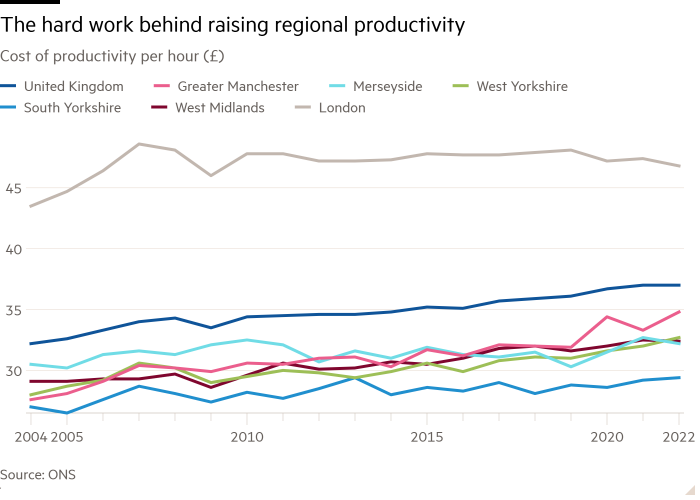
Good afternoon and welcome back to the State of Britain.
I’m Jennifer Williams, the FT’s northern England correspondent, covering for Peter while he takes a break.
Tuesday saw an esteemed gathering in Manchester’s Bridgewater Hall. A thousand people — including some very big names from the past 40 years of British politics — gathered to pay their respects to Sir Howard Bernstein, the late chief executive of Manchester council.
However Bernstein was no mere council chief executive. In the words of former chancellor George Osborne, Bernstein was the “single most important” public servant this country has seen in the past 30 years. Not just in local government, but full stop.
Bernstein’s story is about the transformation, one that is a long way from complete, of an urban economy that in the 1980s looked in danger of collapsing.
And as such, it contains lessons for a new generation of ministers now wanting to lever in private investment on a national scale.
Doing things differently
In recent years the phrase “we do things differently here” has come to be somewhat overused by those promoting Manchester’s story.
But Bernstein actually did do things differently, out of sheer necessity.
His mission was the transformation of Manchester’s ailing post-industrial economic landscape. He thought the city needed to stand on its own two feet, rather than relying on endless fiscal transfers from London. That meant sidestepping obstacles, often imposed by the state itself, and convincing investors that the city was worth a punt.
Let’s start with the puzzle Bernstein had to solve.
To shamelessly steal a figure quoted by the Mancunian economist Mike Emmerich, who worked closely with Bernstein, between 1978 and 1981, the conurbation was losing 127 manufacturing jobs per working day. Manchester was haemorrhaging traditional industry.
After an initial period of trench warfare with Margaret Thatcher’s government, a conscious decision was taken to do something more productive. Bernstein and others sought to identify where the city’s economy went next — and how to get there.
Lessons for metro mayors
Opportunities were identified, some of which didn’t come off. But others did. Crucially, Manchester took its ability to think seriously. It had its own internal think-tank, run by Emmerich, specifically to analyse, research and understand what the economy looked like and where it might go.
As investors came to understand what Manchester was doing, the town hall became seen as a credible partner.
The importance of local reliable institutions is therefore one of the biggest takeaways, for me, from Bernstein’s story.
At present, new ministers are looking to metro mayors — who only exist, incidentally, due to Bernstein’s 2014 devolution deal with Osborne, one of his many local growth strategies — for answers to their economic questions. They want them to create localised growth plans and sell their areas to investors.
Whitehall can’t possibly know the needs of each local economy. But at the moment, there is not an abundance of that kind of expertise across English local government either (partly, it has to be said, as a result of policies enacted by Osborne).
So these institutions are going to have to either be rebuilt, or in some cases, built from scratch, if the sort of endeavours undertaken by Bernstein are to be replicated at scale.
The Productivity Institute’s Philip McCann, who has been researching how investors perceive risk outside of the south east, notes that reassuring investors about propositions beyond London is not just about mayors. It’s also about “the capabilities of the people who don’t appear in the news”.
In Manchester’s case, such people spent years coming up with ways to de-risk their city.
Public land was leveraged. The sovereign wealth of Abu Dhabi was tapped. New financial mechanisms were invented and taken to the Treasury, such as the rotating Housing Investment Fund, a recyclable loan facility for the property sector that in effect underwrote the new skyline you can see in the city centre today.
Some of those, including the HIF, have proved controversial. Even some of its supporters acknowledge that what the fund does is in effect pick winners, not something everyone is comfortable with. Abu Dhabi’s involvement in the city, meanwhile, has not been without controversy either; debates have raged over levels of transparency, where tax gets paid and what human rights records lurk in the background.
Always have a plan B
These were trade-offs Bernstein himself was entirely at ease with. Labour ministers in search of capital may have to weigh up similar questions, amply highlighted by the recent row over P&O, the ferry operator.
Bernstein was also rarely without a plan B. In 2008, his original aim to raise cash for an expanded tram network was thwarted: a proposed congestion charge was defeated by referendum. Central government had little intention of simply funding more trams. So Bernstein suggested a deal: give us the money and we will repay you through the increase in our tax returns.
The model worked, indicating that the traditional Treasury view of the value of such investments may be somewhat flawed.
Bernstein also leveraged the Greater Manchester Pension Fund, the area’s local government pension pot, which for a long time has allocated 5 per cent of its money to local investment propositions. There are signs, in the chancellor’s latest Mansion House address, that she is thinking along similar lines.
Nevertheless, you still end up circling back to the importance of local leadership and institutions. For even if such capital is freed up, a credible set of investable proposals, based on a clear-eyed, real-world understanding of the local economies and markets in question, will be needed.
One property investor told me this week that many local areas have a tendency to pop up at major symposia like the MIPIM property festival, touting shiny “pitchbooks”.
But once the surface is scratched, he said, they do not always stand up under scrutiny.
A final lesson from the Bernstein story relates not to Manchester, but to the hard wiring of central government. The level of imagination that has had to be applied to the city’s turnaround was not only necessary in order to convince private investors — it was necessary because central government had been continually placing its own bets in the south east.
At a panel event the day after Bernstein’s memorial, Lord Jim O’Neill, a long-standing proponent of further investment into northern cities, argued that the chancellor’s increased borrowing headroom must now be used to invest in the sort of transport infrastructure that has not traditionally been a Treasury favourite.
It comes down, he concluded, to “how you measure value”: the Treasury needs to start valuing the impact of potential investments to long term growth. Precisely the approach taken by Bernstein.
Britain in charts

What really matters, of course, is whether Bernstein’s approach worked.
First, the good news.
Over the past couple of decades, Greater Manchester’s productivity has improved. All that work, all that cajoling of investment, all those innovations are starting to show up in the data.
This is not to be underestimated. What looks like a modest productivity improvement on this week’s chart reflects what has in reality been a monumental change in the face and economy of a city.
Anyone involved in this enterprise would also point you back to those job losses I cited at the start. The mountain to climb was huge.
And yet. The fact remains, Greater Manchester is still miles behind London; it is a long way from being able to stand on its own two feet.
To quote researchers from the Resolution Foundation’s Economy 2030 Inquiry, Greater Manchester remains 35 per cent less productive than London, “a demonstrably larger gap than between France’s second city, Lyon, and Paris, which stands at just 20 per cent”.
Widening this conundrum out to regional cities in general, you can see other places are even further behind. That’s how hard this stuff is.
Bernstein, of course, is no longer around to help close the gap. But he started the job — and it will now be for a new generation of civic leaders, thinkers, investors and ministers to finish it.

